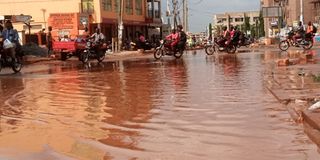Prime
Lira City grapples with old problems

A flooded section of a road in Lira City on March 13, 2023. Lira is still grappling with problems it inherited from its municipal days. PHOTO | BILL OKETCH
What you need to know:
- Lira City started as a trading centre in 1919 and became a township in 1933. In 1954, the township became a town board. It became a town council at independence in 1962, municipal council in 1985 and became a City Council in 2020.
On August 6, 2022, Lira residents were excited with the news of being elevated to a city status, citing expected improvement of service delivery.
However, two years down the road, the city is still grappling with problems from its municipal council days.
The problems include chronic power blackouts, water scarcity, bad roads, poor waste management, and non-functional street lights which has left the city streets engulfed in darkness at night.
Others are insecurity, ungazetted markets, and ungazetted vehicle loading spaces.
Mr Hamza Okello, the principal private secretary to the Tekwaro Lango Paramount Chief, Dr Moses Michael Odongo Okune, said although the infrastructural development has changed since Lira became a city, more work needs to be done to address the other challenges it faces.
“Nothing changed; service delivery (power blackouts- Umeme on and off), waste management still a challenge, street lights are not working, insecurity has continued…,” he said in an interview last Thursday.
Mr Enoch Wandera Wakwalu, the deputy Resident City Commissioner (RCC), said insecurity is something the authorities are struggling to deal with.
“So, being the economic hub of the Lango Sub-region, you would expect Lira City to be the convenient area to do anything. So, even criminals of whatever level be it pickpocketing, thugs on the street or boda boda thieves, you would expect them to come to the city,” he told this newspaper in an interview on November 22, 2022.
The move to create new cities follows recommendations in the Vision 2040 and National Development Plan III for Uganda which recognise the importance of urbanisation as a force for socio-economic transformation across the country.
Reforms for development
According to Mr Okello, there are five key areas that the government should focus on to develop Lira City.
These include regulating and gazetting bus and taxi parks to ensure passenger vehicles have designated areas to park in the city, make underutilised public land available for private sector development to increase city revenue, regulate wetland use, create and gazette market places and establish better road networks.
Dr Morris Chris Ongom, the president of the Lira City Development Forum, also outlined a raft of strategic reforms that he said if adopted would cause “immense development” and “trade order” in Lira City.
The reforms range from governance, physical planning, revenue mobilisation strategy and trade order management in the city.
While making a presentation to the Lira City leaders and stakeholders during the budget conference for financial year 2023/2024 held at Lira City Council hall on November 22, 2022, Dr Ongom said a well-planned city offers immense possibilities to enrich the lives of the inhabitants amid all the complex challenges and that to achieve this leaders must ensure that the people appreciate what is done.
The litany of reforms proposed by Dr Ongom include dialogues with the business community on trade orders in Lira City and the development of Trader Order Ordinance.
He also suggested the setting up of the city commercial court, plan for enforcement, and dialogue on traffic management between city leadership, business community, security, boda boda, and other city transporters.
Others are monitoring traffic management in the city, planning for devolution of City Development Forum structures to lower levels from division to wards, strengthening coordination, partnerships and collaborations with civil society organisations (CSOs), private sector, and community structures.
“As a way of motivating contributions of city staff, the city should initiate city level awards culture to recognise partnerships, innovations, and distinguished service to those who serve diligently and selflessly,” Dr Ongom, who is also the chief executive officer of Global Forum for Development (GLOFORD) Uganda, said.
During the November 2022 budget conference, leaders chose key priority programmes which they believe if effectively implemented in the next financial year would make Lira City a clean, green, smart and eco-friendly urban settlement.
The identified programmes are expected to further support the attainment of the Lira City Council’s goal of increased household incomes, and improved quality of life of city residents.
Mr Emmanuel Wamburu Soita, the town clerk of Lira City, said their proposed strategy for the 2023/2024 financial year seeks to restore the economy back to the medium-term trajectory of between six and seven percent.
“To achieve this, priority will be on interventions that will help us achieve the third National Development Plan (NDPIII) objectives, and commitments in the NRM Manifesto of 2021-2025,” he told stakeholders during the budget conference.
Specifically, they have prioritised implementation of Parish Development Model (PDM), road, schools and health infrastructure development.
Under health, Village Health Teams (VHTs) will be strengthened through training and facilitation to enhance individual and community health programmes, increase staffing levels to the required staffing norms in critical areas for; anaesthetists, pharmacists, dispensers, and critical operating theatre staff.
“Equipping health centre IVs and hospital theatres in order to address maternal and neonatal health care. The health centre IVs will be renovated and equipped to provide comprehensive emergency obstetric and neonatal care services,” the town clerk said.
He added that staff accommodations will also be built in health centre IIIs and health centre IVs. Improving the availability and functionality of X-ray and laboratory services.
Mr Sam Atul, the Lira City mayor, said they will encourage the community to engage in commercial agriculture “but in a very technical manner that they can benefit from the limited space we have”.
“Every other time this city will be described as a growing city, the economy is robust, but the question we should ask as leaders; are our people part of that benefit?” he said.
He added: “And that’s why it’s key that we should struggle to have increased household incomes so that the lives of the local people in this city can change. Otherwise, we shall be building beautiful white castles in this city but not enjoyed by the people of this city.”




